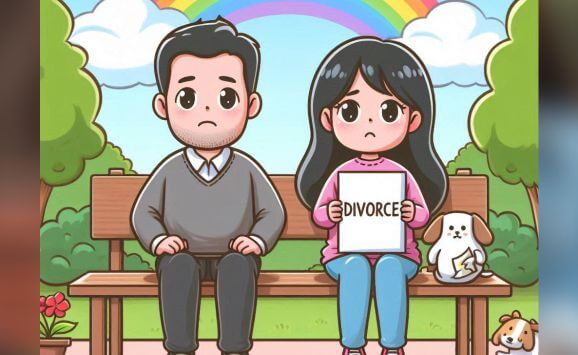Learning how to cope with divorce, a life-changing event that can leave you feeling lost, overwhelmed, and uncertain about the future is non-negotiable.
It’s a journey filled with a rollercoaster of emotions, from sadness and anger to relief and hope.
But, with the right coping strategies, life lessons and support, you can find your way out of this challenging transition and emerge stronger than ever before.
In this article, we’ll explore practical ways to manage the emotional and practical aspects of splitting up, helping you move forward with resilience and grace.
Learn about the importance of therapy, support groups, maintaining physical health, and building new routines that initiate new beginnings and lead to personal growth and happiness post-divorce.
Suggested: Avoid these when Healing from Heartbreak
You might want to pin the image below.

Key Takeaways
- Divorce is emotionally intense, involving grief, anger, and relief.
- Splitting up reshapes social circles, often straining friendships and redefining social dynamics.
- Saying goodbye is essential for healing. Create closure rituals, reflect on lessons learned, and honor your past relationship to move forward and embrace new beginnings.
- Divorce can lead to personal growth. Set new goals, follow your passions, and find inspiration for renewal and joy.
What is Divorce?
Divorce is the legal process through which a marriage is formally dissolved, ending the marital union between two persons.
Divorce represents a significant emotional and psychological transition for both parties, which is usually followed by feelings of loss, grief, and adjustment as they live life separately.
It involves addressing and resolving various personal, social, and financial challenges to facilitate a new chapter in each individual’s life.
Understanding Divorce as a Life-Changing Event

Parting ways in marriage is one of the most stressful and life-altering experiences you can endure, and that is why knowing how to cope with splitting up is a path every victim must take.
The dissolution of marriage covers not only the legal termination of a relationship but also emotional and psychological upheavals.
Both parties involved, along with their families, may experience a sense of loss, grief, and even an identity crisis.
Breaking up in marriage makes reconfiguring your life expectations and plans necessary, which can be draining.
The Role of Emotion in Divorce
Emotions such as anger, sadness, and confusion are common responses to splitting up, as victims cope with the end of a partnership that was once central to their daily lives.
This emotional turbulence is made worse by psychological stressors, including anxiety, depression, and reduced self-esteem.
If involved, children face considerable impacts, ranging from changes in living arrangements to possible alterations in their upbringing environment, which can affect their emotional and psychological development.
Prevalence of Divorce
Statistically, the prevalence of parting ways in marriage underscores its significance as a societal challenge.
In the United States, nearly 40-50% of marriages end in divorce, a figure that reflects a substantial portion of the population dealing with this tumultuous life event at some stage.
Expert opinions further elucidate the gravity of divorce: relationship specialists and psychologists frequently assert that the end of a marriage can have long-term effects on mental health and interpersonal relations.
Social Impacts
Socially, the ramifications of divorce extend beyond the immediate family.
Friendships might be strained, social circles redefined, and individuals often find themselves navigating new social dynamics, particularly challenging in a landscape where societal norms frequently favor married couples.
This shift can impact your social support network, which is crucial for emotional stability and recovery.
Understanding these layers of impact it carries is important for those going through it to know how to cope with the splitting up.
Such awareness underscores the necessity of effective coping mechanisms and support systems, which are central as you strive to rebuild your life post-divorce.
Recognizing divorce as a multidimensional, life-changing event sets the foundation for finding the right strategies to manage its far-reaching effects.
Related Posts
How to Rebuild Self-Confidence after Separation
How to Adapt to Life Changes after Breaking Up
Addressing Gut Feelings in Relationships
Beware of Relationship Anxiety, the Relationship Killer
Signs You Have a Fear of Intimacy
Building Emotional Intimacy in Marriage
Causes of Divorce

Understanding the causes of splitting up can provide insights into marital relationships and offer guidance for those going through these turbulent waters.
Here are common reasons why marriages end and the factors contributing to marital breakdowns.
1. Communication Breakdown
Poor communication leads to misunderstandings, unresolved conflicts, and growing resentment, eroding trust and intimacy and potentially causing separation.
2. Infidelity
Cheating undermines trust and causes deep emotional pain, often leading to splitting up.
3. Financial Issues
Money problems, differing spending habits, and financial mismanagement create conflict and tension, which can contribute to relationship breakdowns in marriage.
4. Incompatibility
Changes in interests, values, or life goals can create rifts between partners, leading to a split.
5. Lack of Intimacy
A decline in emotional and physical intimacy results in feelings of isolation and dissatisfaction, potentially leading to separation.
6. Unresolved Conflict
Accumulated, unresolved conflicts cause ongoing resentment and animosity, straining the relationship and driving partners apart.
7. Different Life Goals
Divergent plans and aspirations create fundamental incompatibility, leading to disconnection and dissatisfaction in marriage.
8. Abuse and Neglect
Physical, emotional, or psychological abuse creates an unsafe environment, making separation a necessary step for personal safety and well-being.
The Emotional Impact of Divorce on Men and Women

The emotional toll of divorce is enormous, affecting individuals in ways that can be both intense and confusing.
For many, the journey begins with a complex mix of grief, anger, sadness, relief, and anxiety.
These feelings are influenced by several factors, including gender roles and individual circumstances, adding layers of confusion to an already challenging life-changing event.
Grief
Grief is a common initial response, as individuals mourn the loss of their marital relationship and the future they had envisioned.
This sense of grief can be made worse by feelings of failure or inadequacy.
Anger
Both men and women may experience anger, anger at their former partner, at themselves, or at the situation as a whole.
Sadness
Sadness is another pervasive emotion, stemming from the end of a significant emotional investment.
This could go on for as long as the victim is not able to find closure and move on.
Relief
Relief can also be a part of the emotional equation, particularly if the marriage is fraught with conflict or unhappiness.
Some people who experience relief after a marriage ends are usually the instigators.
Anxiety
This relief, however, is often followed by anxiety regarding the future, financial uncertainties, and the challenges of co-parenting if children are involved.
Each of these emotions can manifest differently between men and women, shaped by societal expectations and individual coping mechanisms.
Suggested: Mastering Relationship Dynamics
How Men and Women React to Splitting Up

Studies indicate that men and women may face unique emotional challenges during divorce.
According to research by the Journal of Men’s Health, men often struggle more with the isolation and emotional detachment that can follow a dissolution of marriage.
Men might also suppress their emotions more frequently due to social stigmas surrounding male vulnerability, leading to higher risks of depression and substance abuse.
Women, on the other hand, frequently grapple with increased financial stress and the dual pressures of work and single parenting.
Yet, women often possess more robust social networks, which can provide crucial emotional support.
Experts like family therapist Dr. Judith Kilpatrick suggest that acknowledging and validating these emotions is a critical step in the healing process.
Recognizing that feelings of grief, anger, sadness, relief, and anxiety are normal responses can help you find a way through your emotional landscape to learn how to cope with divorce.
Understanding the emotional impact of ending a marriage, framed within social and individual contexts, can empower those going through such a life-changing event.
It validates your feelings and reassures you that these emotional experiences are a natural part of the journey towards recovery and personal growth.
Suggested: How to Embrace Life Transformation in Your 30s
Finding Closure after Divorce

One important aspect of knowing how to cope with divorce and achieving healing is finding closure, which allows you to say goodbye to the relationship and move forward with your life.
Here’s how to find closure after parting ways with a partner:
The Significance of Saying Goodbye
Saying goodbye to a relationship is more than just a formality; it’s an essential step in the healing process.
Acknowledging the end of your marriage helps you validate your feelings and experiences.
It allows you to honor what the relationship meant to you while also recognizing that it’s time to let go.
This emotional release is vital for moving on and can pave the way for new beginnings.
Creating a Closure Ritual
A closure ritual can be a powerful way to process emotions and mark the end of a chapter in your life.
This could be as simple as writing a letter to your ex-spouse expressing your feelings, gratitude, sorrow, or even anger, and then safely burning or burying it.
Alternatively, you might choose to create a small ceremony with close friends or family, sharing memories and affirming your commitment to moving forward.
Whatever form it takes, a closure ritual can provide a sense of completion and help you transition into the next phase of your life.
Reflecting on Lessons Learned
After a divorce, it’s necessary to have a reflection on the lessons learned from the experience.
Consider what the relationship taught you about yourself, your needs, and your desires.
This reflection can lead to personal growth, helping you identify patterns and areas for improvement in future relationships.
Embracing these insights not only initiates healing but also empowers you to build healthier connections moving forward.
Finding closure after divorce is a vital step in reclaiming your life and happiness.
Related: Emotional Impact of Life Transformation on Mental Health
How to Cope with Splitting Up in Marriage

Effectively coping with splitting up in marriage involves a pronged approach.
Here are some strategies on how to cope with splitting up:
1. Therapy and Counseling
One vital strategy is seeking professional help, such as therapy or counseling.
Trained therapists can provide tailored guidance, helping individuals process their emotions and develop constructive coping mechanisms.
2. Join Support Groups
Joining support groups is another beneficial approach. Connecting with others who are experiencing similar situations can provide a sense of solidarity and understanding.
These groups offer shared experiences, fostering an environment where individuals can learn from one another and feel less isolated.
3. Find New Routines
Developing new routines is important in creating stability during life-changing times.
Establishing daily habits and goals can provide a sense of purpose and normalcy.
Focusing on personal growth by pursuing new hobbies or skills is also an essential aspect of moving forward.
Engaging in activities that bring joy and fulfillment can be a powerful antidote to the stress and sadness of divorce.
4. Maintain Physical Health
Maintaining physical health should not be ignored. Engage in regular exercise, as it has been scientifically shown to reduce stress and improve mood.
Coupled with proper nutrition, taking care of your body can significantly impact your general well-being.
A balanced diet supports mental health, ensuring that the body has the necessary nutrients to function optimally.
5. Keep in Touch with Family and Friends
Building a support network of family and friends is invaluable. Leaning on trusted individuals for emotional support can provide comfort and reassurance.
This network acts as a pillar of strength, offering practical help and uplifting spirits during this life-changing time.
Infusing these coping strategies can pave the way for resilience and improved recovery.
Embracing New Beginnings and Finding Happiness after a Divorce

Divorce, though challenging, can be viewed as a stepping stone towards a fresh start.
It is an opportunity to rediscover personal interests and passions that might have taken a backseat during the marriage.
Identifying and pursuing hobbies or activities that bring joy can significantly aid in rebuilding your sense of self and well-being.
Whether it’s rekindling a love for painting, diving into a new book, or exploring outdoor adventures, these can fuel a renewed zest for life.
Setting New Goals after Divorce
Setting new goals is another vital strategy for embracing new beginnings.
These goals need not be grandiose; they can be as simple as committing to regular physical exercise, learning a new skill, or even traveling to a new destination.
What’s important is to create a vision for the future that excites and motivates you.
This vision acts as a roadmap, guiding you through the uncertainties and providing a sense of purpose and direction.
Personal Growth and Positive Changes
Moreover, the potential for positive changes and personal growth following divorce should not be underestimated.
Many individuals have found that this life transition catalyzes self-discovery and transformation.
They have reported increased confidence, emotional resilience, and a deeper understanding of their values and desires.
Embracing this potential can turn a difficult period into a powerful journey towards self-improvement and happiness.
Inspirational Stories from Others
Inspirational stories from others who have successfully recovered from divorce can be a source of hope and motivation.
For instance, Michelle, a divorcee, shares, “Divorce was tough, but it led me to start my own business and find a new community of supportive friends.”
Similar tales of resilience and success underscore the fact that happiness and fulfillment are indeed attainable after splitting up.
Optimism, intentional living, and the courage to embrace new opportunities can transform this challenging chapter into a period of incredible growth and newfound joy.
Frequently Asked Questions
How to get over a divorce and move on?
Focus on self-care, set new goals, surround yourself with supportive people, and embrace new opportunities. Time, patience, and professional support can aid healing.
How to emotionally heal from divorce?
Allow yourself to grieve, seek therapy or counseling, establish new routines, and connect with supportive friends and family. Self-compassion and time are crucial for healing.
What is the hardest part of a divorce?
The hardest part is often coping with the loss of companionship, adjusting to a new routine, and managing the emotional and practical changes that follow.
How to accept a divorce you don’t want?
Accepting an unwanted divorce involves acknowledging your feelings, seeking support, focusing on personal growth, and gradually adapting to your new reality with patience and self-care.
Final Word from The Conducts of Life
Learning how to cope with divorce is undeniably challenging, but with the right strategies, you can transform this life-altering event into an opportunity for growth.
Embrace therapy, build support networks, and create new routines.
By focusing on personal development and finding closure, you can move forward with resilience, ultimately emerging stronger and more fulfilled.
Remember, this difficult period can be the foundation for a renewed and joyful chapter in your life.
Pious Clements is the insightful voice behind "The Conducts of Life" blog, where he writes about life ethics, self-development, life mastery, and the dynamics of people and society.
With a profound understanding of human behaviuor and societal dynamics, Pious offers thought-provoking perspectives on ethical living and personal growth.
Through engaging narratives and astute observations, he inspires readers to navigate life's complexities with wisdom and integrity, encouraging a deeper understanding of the human experience and our place within society.
